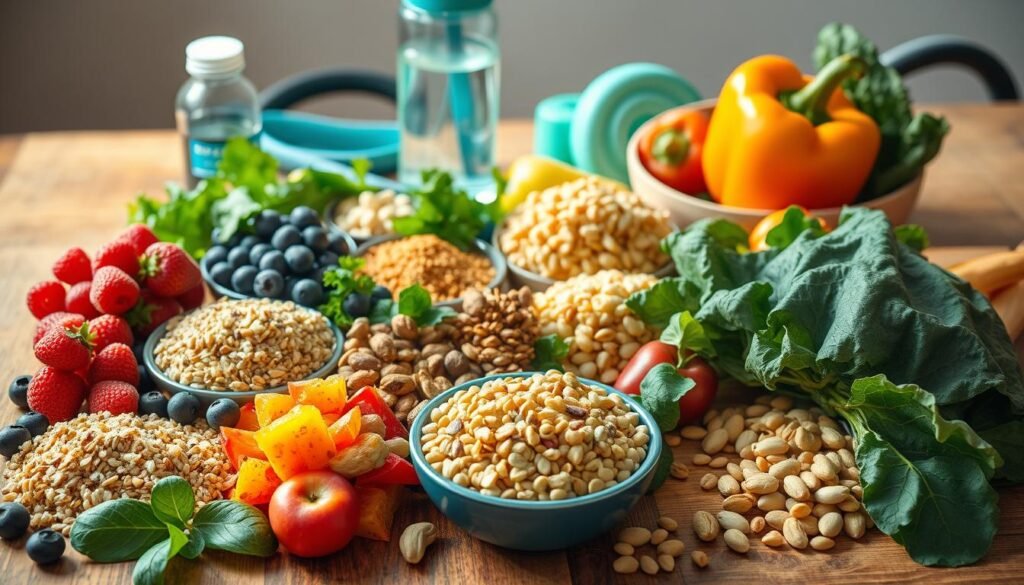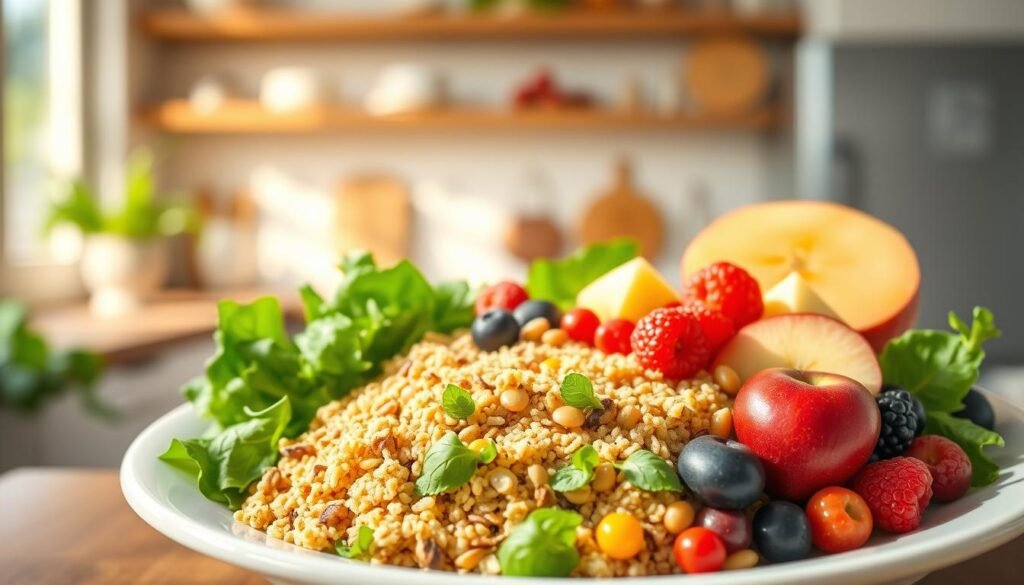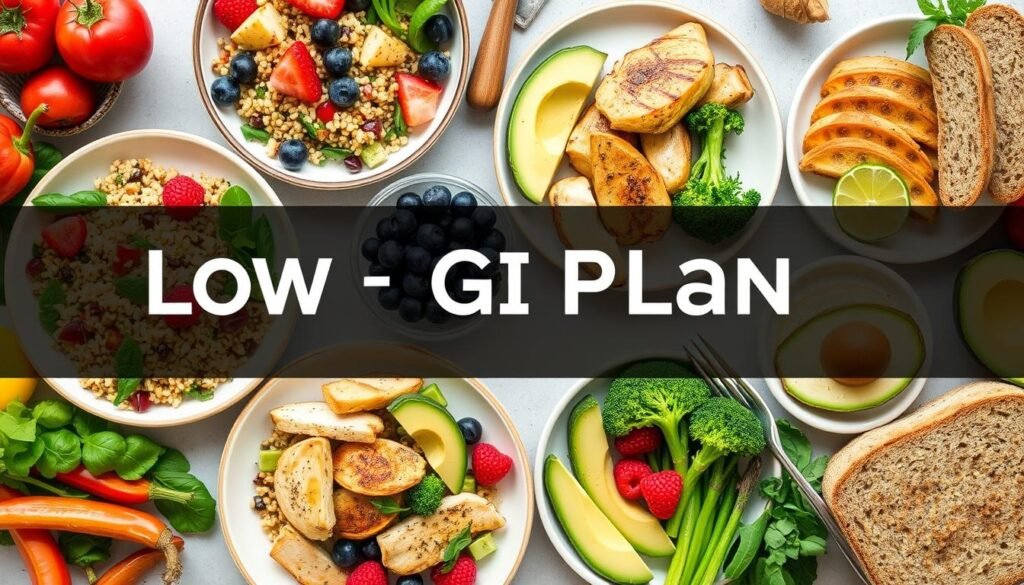A recent meta-analysis has found something hopeful for women with PCOS. It shows that sticking to a low glycemic index (GI) diet can greatly improve PCOS symptoms. This includes issues like acne, excessive body hair, and emotional health challenges. Considering 6% to 12% of women in their childbearing years have this hormonal disorder, effective dietary strategies are key.
What are Low Glycemic Index (GI) Foods for Managing PCOS? They’re foods that slowly release glucose into your blood. This is great for controlling blood sugar and fighting insulin resistance, which many women with PCOS face. Better insulin sensitivity can ease hormone-related symptoms. It also helps with mood stability and energy levels. Focusing on whole, nutrient-rich foods is the way to improve hormonal balance and health.
Key Takeaways
- A low GI diet can improve various PCOS symptoms, including emotional health and acne.
- Insulin resistance is a common factor affecting those with PCOS, making blood sugar regulation critical.
- Whole foods and nutrient-dense options are central to effective nutritional strategies for PCOS.
- Incorporating low GI foods helps achieve better hormonal balance and overall well-being.
- Effective dietary changes can lead to significant weight loss, further alleviating PCOS symptoms.
Understanding PCOS and Its Symptoms
Polycystic Ovary Syndrome (PCOS) is a complex endocrine disorder. It affects about 15% to 18% of women of reproductive age. This condition leads to a hormonal imbalance and several PCOS symptoms.
These symptoms include irregular periods, too much hair growth, acne, and gaining weight. Each of these can greatly affect a woman’s life.
PCOS can cause ovarian cysts which might lead to fertility issues. Also, insulin resistance is common in women with PCOS. This can make other symptoms worse. Certain lifestyle and environmental factors are important in managing the condition.
Women with PCOS face a higher risk for long-term diseases like endometrial and ovarian cancer. The condition’s link to the gut microbiome and metabolomics is gaining attention. This highlights the need for more research on PCOS. A balanced diet is crucial. It can regulate hormones, easing acne, irregular periods, and fertility issues.
Eating every three to four hours helps manage insulin levels in people with PCOS. Making smart food choices can ease PCOS symptoms. Check out resources like healthy meal ideas for PCOS for more information on diet management.
| PCOS Symptoms | Impact on Health |
|---|---|
| Irregular menstruation | Increases risk of infertility |
| Excess hair growth | May lead to psychological stress |
| Acne | Affects self-esteem and mental health |
| Weight gain | Compounds insulin resistance and hormonal imbalance |
What is Insulin Resistance and Its Role in PCOS?
Insulin resistance means your body’s cells aren’t responding well to insulin. This leads to higher blood sugar levels. It’s common in individuals with Polycystic Ovary Syndrome (PCOS), affecting their hormonal balance. High insulin levels can cause weight gain and irregular periods.
About 80% of people with PCOS are insulin-resistant. This makes managing weight hard and raises the risk of diabetes and heart disease. To improve insulin sensitivity, focus on changes in lifestyle and diet.
Eating foods with a low glycemic index (GI) helps. These foods make blood sugar levels more stable. That can improve insulin sensitivity and help with PCOS symptoms like weight management. To track your progress, visit monitoring weight and BMI.
Regular exercise also plays a crucial role. Try to get 150 minutes of moderate exercise every week. This can greatly improve your insulin sensitivity. It also helps balance your hormones, making life better for those with PCOS.
| Health Factors | Low GI Diet | High GI Diet |
|---|---|---|
| Insulin Sensitivity | Improves | Decreases |
| Weight Management | Aids in Weight Loss | Promotes Weight Gain |
| Blood Sugar Levels | Stabilizes | Fluctuates |
| Hormonal Regulation | Promotes Balance | Can Disrupt |
It’s crucial to understand insulin resistance and PCOS. Tackling insulin resistance can better blood sugar and hormone levels. This helps people with PCOS improve their health significantly.
What is Glycemic Index (GI)?
The Glycemic Index (GI) ranks carbs based on their blood sugar response. This system separates foods into three categories: low (≤55), medium (56-69), and high (≥70) GI. Low glycemic foods are better because they digest slowly. This leads to a gradual increase in blood sugar levels.
Knowing about the Glycemic Index helps people make better food choices. This is especially true for those with PCOS, affecting about 5 million women in the United States. High GI diets can make insulin resistance worse. This problem is common in PCOS patients. They tend to eat more high-glycemic index foods, which raises the risk of diabetes and heart diseases.
Adding more low glycemic foods to your diet can even out your blood sugar levels. This can help improve PCOS symptoms. Choose whole grains instead of processed ones since they have a lower GI. This doesn’t just benefit your health. It also helps in managing polycystic ovary syndrome.
| GI Category | GI Range | Dietary Impact |
|---|---|---|
| Low | ≤55 | Gradual rise in blood sugar; suitable for managing PCOS |
| Medium | 56-69 | Moderate blood sugar increase; caution advised |
| High | ≥70 | Rapid spike in blood sugar; should be limited |
The Benefits of Low Glycemic Index (GI) Foods for Managing PCOS Symptoms
Eating low GI foods has lots of perks for those with PCOS. It helps make PCOS symptoms better, like making periods more regular and helping with weight. These foods help keep blood sugar levels steady, lowering the chance of getting related health problems.
A low GI diet boosts insulin sensitivity and helps balance hormones. People with PCOS who follow this diet feel better overall. They have less acne and their hair grows healthier. This is good for reproductive health too.
Low GI foods let out energy slowly. This avoids the highs and lows that come with high GI foods. This is especially good for people who are overweight. They are at a higher risk for diabetes and heart problems.

Here’s a table summarizing some key benefits of a low GI diet in relation to PCOS:
| Benefit | Description |
|---|---|
| Improved Insulin Sensitivity | Low GI foods help control insulin, which is key for managing PCOS. |
| Hormonal Balance | They help keep hormone levels stable, aiding symptom management. |
| Enhanced Emotional Well-being | A low GI diet is shown to improve mood in PCOS patients. |
| Reduced Inflammation | These foods may lower inflammation, lessening PCOS symptoms. |
| Better Menstrual Regularity | Eating low GI foods leads to more regular menstrual cycles in PCOS women. |
Adopting a low GI way of eating is a great base for managing PCOS symptoms and improving health.
Exploring Low Glycemic Index (GI) Foods for Managing PCOS Symptoms
Women with PCOS find that what they eat is very important. Choosing low glycemic index (GI) foods helps with blood sugar and health. We’ll look at fruits, veggies, grains, and legumes.
Fruits and Vegetables
Focusing on low GI fruits is key for PCOS. Foods like berries, apples, and greens are great. They pack nutrients and don’t spike your blood sugar much.
These fruits help keep insulin levels even. This aids hormone balance and weight control.
Whole Grains
Eating whole grains like brown rice and quinoa is good for your blood sugar. These grains take longer to digest, keeping your energy up. They’re also full of fiber, which helps your gut and weight loss efforts.
Pulses and Legumes
Legumes like lentils, beans, and chickpeas are super healthy. They’re low GI and have lots of fiber, managing insulin well. Adding these protein foods is smart for managing PCOS.
| Food Category | Examples | Benefits |
|---|---|---|
| Low GI Fruits | Berries, Apples, Leafy Greens | Rich in nutrients, promote stable insulin levels |
| Whole Grains | Brown Rice, Quinoa, Whole Grain Pasta | Slow digestion, helps maintain blood sugar levels |
| Pulses and Legumes | Lentils, Beans, Chickpeas | High in fiber, aids in insulin regulation |
How Low GI Foods Aid Blood Sugar Regulation
Low glycemic index (GI) foods are key in controlling blood sugar. This is crucial for women with Polycystic Ovary Syndrome (PCOS). PCOS leads to issues like irregular periods, too much hair growth, and weight gain troubles. Insulin resistance is a big problem with PCOS, making symptoms worse. Eating foods with a low GI can help make insulin work better and keep blood sugar steady.
Low GI foods stop blood sugar from going up too fast. For those finding it hard to control weight, low GI foods help. They curb hunger and help with weight loss. Adding lean proteins and high-fiber foods to meals makes blood sugar more stable.

Research says low GI diets can fix insulin issues and make periods more regular with weight loss. Most people with PCOS have a hard time losing weight because of cravings. A diet with low GI foods is very useful. Doing regular exercise also helps the body use insulin better and improves health.
To handle PCOS symptoms well, it’s important to know how low GI foods affect blood sugar. Making smart choices about carbs, like picking whole grains and avoiding sugary snacks and drinks, is beneficial. These choices lay the groundwork for better PCOS management.
| Food Category | Examples | Benefits |
|---|---|---|
| Low GI Carbohydrates | Quinoa, brown rice, oats | Stabilizes blood sugar levels |
| Lean Proteins | Chicken, fish, tofu | Aids in weight management |
| High-Fiber Foods | Fruits, vegetables, legumes | Promotes healthy digestion |
| Healthy Fats | Olive oil, avocados, nuts | Supports hormone regulation |
Nutrition for PCOS: Key Components
Eating right is key for managing Polycystic Ovary Syndrome (PCOS). It helps ease symptoms and boosts quality of life. A balanced diet with Complex Carbohydrates, Fiber-Rich Foods, and Healthy Fats is vital. These parts help with insulin sensitivity, lowering inflammation, and managing weight.
Complex Carbohydrates
Complex Carbs are in whole grains and give you energy without big sugar spikes. Adding brown rice, quinoa, and whole-wheat pasta can help keep hormones in check. Foods with a low glycemic index (GI) are great. They don’t cause quick blood sugar rises, which is good for PCOS management.
Fiber-Rich Foods
Fiber-Rich Foods come from veggies, fruits, and legumes. They aid in digestion and make insulin work better. Choosing high-fiber foods helps keep blood sugar stable, vital for women with PCOS. Foods like chickpeas and lentils also cut down oxidative stress and inflammation.
Healthy Fats and Proteins
Adding healthy fats and proteins to your diet helps with hormone health and feeling full. Avocados, olive oil, and nuts are good fats that keep everything running smoothly. Lean proteins from chicken, fish, and plant-based sources balance nutrients for PCOS. This mix of macros promotes a well-balanced health approach. Eating healthy fats also fights against PCOS-related inflammation.
| Nutrition Component | Benefits |
|---|---|
| Complex Carbohydrates | Sustained energy, prevents blood sugar spikes |
| Fiber-Rich Foods | Improves digestion, enhances insulin sensitivity |
| Healthy Fats | Regulates hormones, reduces inflammation |
| Proteins | Aids in weight management, promotes satiety |
Want more info on eating right? Check out tips on a balanced diet here. Learning about these diet parts can greatly better health for those with PCOS.
Creating a Low GI Meal Plan for PCOS Management
A Low GI Meal Plan can make a big difference in handling PCOS symptoms and improving your health. Eating foods with a low glycemic index helps keep insulin levels stable. It also aids in weight control and reduces chronic inflammation linked to PCOS. Here are tasty and healthy meal ideas for your day.
Breakfast Ideas
- Whole grain oats with seasonal berries make a filling and nutritious breakfast.
- Avocado on whole-grain toast provides healthy fats and energy-supporting carbs.
Lunch Suggestions
- Quinoa salad with veggies and grilled chicken or fish is great for a PCOS diet.
- Meals with chickpeas or lentils add protein and fiber, helping with blood sugar.
Dinner Options
- Lentil soup and whole grain bread offer a cozy, low GI dinner.
- A colorful veggie stir-fry with tofu or lean meat is packed with nutrients for health.

For tips on a PCOS-friendly meal plan, check out this useful guide. Adopting these eating habits can lead to a healthier lifestyle that tackles the challenges of PCOS head-on.
Additional Dietary Approaches to Support PCOS Management
Polycystic ovarian syndrome (PCOS) affects many aspects of a woman’s health. A low glycemic index (GI) diet helps a lot. But, trying different diets can boost well-being even more. The *Anti-Inflammatory Diet*, *Mediterranean Diet*, and *Ketogenic Diet* are great options for women with PCOS.
Anti-Inflammatory Diet
The Anti-Inflammatory Diet focuses on whole foods rich in antioxidants and low in processed items. It helps fight inflammation, which is tied to PCOS and its effects like insulin resistance. Eating foods like berries, leafy greens, and fatty fish aids in balancing hormones and improving health.
Mediterranean Diet
The Mediterranean Diet is all about healthy fats, grains, fruits, and veggies. It’s good for weight and metabolism in women with PCOS. Adding olive oil, legumes, and nuts to your diet helps manage PCOS. It also keeps insulin levels in check.
Ketogenic Diet
The Ketogenic Diet cuts carbs and ups fat intake. This tactic is proving to help with PCOS weight loss and metabolic issues. By eating fewer carbs, women may see better insulin sensitivity. This can mean fewer PCOS symptoms.
Conclusion
Adding low glycemic index foods to your diet is key for tackling PCOS symptoms. This summary of Low GI Foods and PCOS highlights that while people react differently to diets, low GI foods are proven to help balance hormones and improve health. For women with PCOS, it’s crucial to eat in a way that improves insulin sensitivity and metabolic health.
Combining low GI food intake with regular exercise and stress management boosts health for those with PCOS. Studies show that women on low-GI diets see better menstrual cycles, showing its importance for overall health. A balanced diet helps deal with obesity, mental health, and metabolic issues common in PCOS sufferers.
As we learn more about PCOS, low GI foods remain essential for long-term improvement. Women will notice these dietary changes help with specific symptoms and enhance overall health.